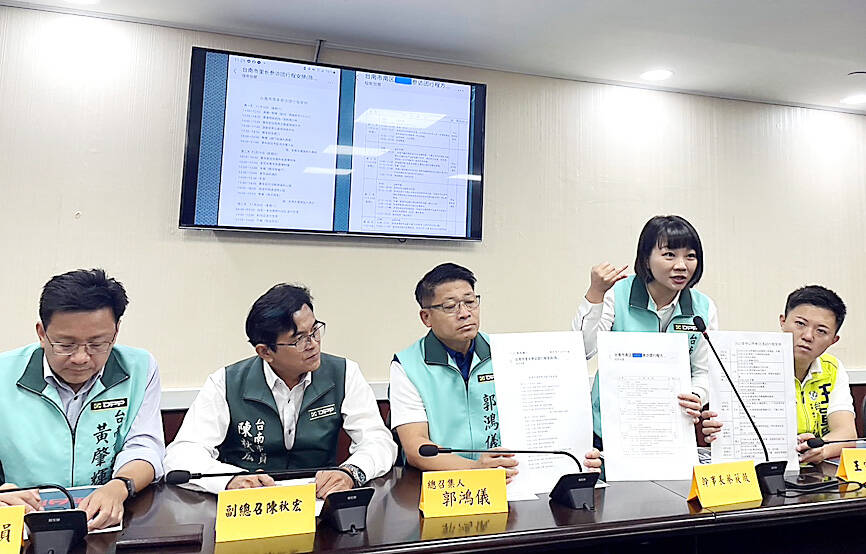Public prosecutors have summoned borough wardens from Tainan who have returned from trips to China amid judicial investigations across the nation into reported incidents of Chinese interference in next month’s presidential and legislative elections.
Kuo Hong-yi (郭鴻儀), Chen Chiu-hong (陳秋宏) and other members of the Democratic Progressive Party (DPP) caucus at the Tainan City Council at a news conference yesterday demanded tougher measures to prevent local officials from helping to organize junket trips to China.
“China is clearly using ‘united front’ tactics to meddle in our elections, by buying off voters and using propaganda, intimidation, pressure and economic enticement to persuade people not to support the DPP,” Kuo said. “It is now a very serious situation ... We know of many borough wardens engaging in it, from almost all of Tainan’s districts.”

Photo: Courtesy of the Democratic Progressive Party caucus at the Tainan City Council
Many wardens have led local residents on tours of China at low prices thanks to huge financial subsidies from the Chinese government, which is “hiding behind the pretext of tourism and cultural exchanges, but its real purpose is to meddle in the January elections,” Kuo said.
Such trips are known as “VIP treatment after landing,” as a person basically only pays for their air ticket to China, and once they land, almost everything is taken care of, with the Chinese government paying for their tour guide, transport, accommodation at luxury hotels, meals, visits to attractions and historic sites, trips to museums and meetings with local officials, Kuo said.
Reports indicate that such interference not only affects Tainan; it affects the whole nation as those heading the groups are elected borough and village wardens, as well as the heads of temples and apartment and neighborhood management committees, Chen said.
On paper, they are collecting fees to pay for the tour, but are actually only paying for the flight, Chen said.
“We have seen people only paying NT$18,000 for an eight-day trip in China; others paid NT$10,000 for a five-day trip,” Chen said.
“This is no different from buying votes... China is infiltrating our local neighborhoods with these subsidized trips,” he said.
Through these trips, Chinese officials are brainwashing Taiwanese, convincing them that China and Taiwan belong to the “same family,” and that they should embrace China, Chen said.
Meanwhile, officials at the Supreme Prosecutors’ Office said they are investigating 115 reports of Taiwanese groups going on Chinese-subsidized tours with more than 500 people involved.
They said that they are also probing 1,820 suspected vote-buying incidents and 822 cases of suspected election betting.

‘CORRECT IDENTIFICATION’: Beginning in May, Taiwanese married to Japanese can register their home country as Taiwan in their spouse’s family record, ‘Nikkei Asia’ said The government yesterday thanked Japan for revising rules that would allow Taiwanese nationals married to Japanese citizens to list their home country as “Taiwan” in the official family record database. At present, Taiwanese have to select “China.” Minister of Foreign Affairs Lin Chia-lung (林佳龍) said the new rule, set to be implemented in May, would now “correctly” identify Taiwanese in Japan and help protect their rights, the Ministry of Foreign Affairs said in a statement. The statement was released after Nikkei Asia reported the new policy earlier yesterday. The name and nationality of a non-Japanese person marrying a Japanese national is added to the

AT RISK: The council reiterated that people should seriously consider the necessity of visiting China, after Beijing passed 22 guidelines to punish ‘die-hard’ separatists The Mainland Affairs Council (MAC) has since Jan. 1 last year received 65 petitions regarding Taiwanese who were interrogated or detained in China, MAC Minister Chiu Chui-cheng (邱垂正) said yesterday. Fifty-two either went missing or had their personal freedoms restricted, with some put in criminal detention, while 13 were interrogated and temporarily detained, he said in a radio interview. On June 21 last year, China announced 22 guidelines to punish “die-hard Taiwanese independence separatists,” allowing Chinese courts to try people in absentia. The guidelines are uncivilized and inhumane, allowing Beijing to seize assets and issue the death penalty, with no regard for potential

‘UNITED FRONT’ FRONTS: Barring contact with Huaqiao and Jinan universities is needed to stop China targeting Taiwanese students, the education minister said Taiwan has blacklisted two Chinese universities from conducting academic exchange programs in the nation after reports that the institutes are arms of Beijing’s United Front Work Department, Minister of Education Cheng Ying-yao (鄭英耀) said in an exclusive interview with the Chinese-language Liberty Times (the Taipei Times’ sister paper) published yesterday. China’s Huaqiao University in Xiamen and Quanzhou, as well as Jinan University in Guangzhou, which have 600 and 1,500 Taiwanese on their rolls respectively, are under direct control of the Chinese government’s political warfare branch, Cheng said, citing reports by national security officials. A comprehensive ban on Taiwanese institutions collaborating or

STILL COMMITTED: The US opposes any forced change to the ‘status quo’ in the Strait, but also does not seek conflict, US Secretary of State Marco Rubio said US President Donald Trump’s administration released US$5.3 billion in previously frozen foreign aid, including US$870 million in security exemptions for programs in Taiwan, a list of exemptions reviewed by Reuters showed. Trump ordered a 90-day pause on foreign aid shortly after taking office on Jan. 20, halting funding for everything from programs that fight starvation and deadly diseases to providing shelters for millions of displaced people across the globe. US Secretary of State Marco Rubio, who has said that all foreign assistance must align with Trump’s “America First” priorities, issued waivers late last month on military aid to Israel and Egypt, the